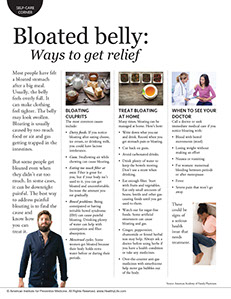SYMPTOM CHECKER
CONDITIONS
Male
Female
Child
Arm, Hand & Shoulder Concerns
Legs & Feet Concerns
Dental & Mouth Concerns
Ear & Nose
Eye Conditions
Head Conditions
Arm, Hand & Shoulder Concerns
Legs & Feet Concerns
Front
Back
Arm, Hand & Shoulder Concerns
Dental & Mouth Concerns
Ear & Nose
Eye Conditions
Head Conditions
Arm, Hand & Shoulder Concerns
Dental & Mouth Concerns
Ear & Nose
Eye Conditions
Head Conditions
Front
Back
Arm, Hand & Shoulder Concerns
Neck Links
Head & Neck Concerns
Arm, Hand & Shoulder Concerns
Neck Links
Head & Neck Concerns
Front
Back
Online Clinic
Wise Healthcare
Bloated belly: Ways to get relief
Print on Demand
Most people have felt a bloated stomach after a big meal. Usually, the belly feels overly full. It can make clothing feel tighter. The belly may look swollen. Bloating is usually caused by too much food or air and gas getting trapped in the intestines.
But some people get bloated even when they didn’t eat too much. In some cases, it can be downright painful. The best way to address painful bloating is to find the cause and know how you can treat it.
Bloating culprits
The most common causes include:
• Dairy foods. If you notice bloating after eating cheese, ice cream, or drinking milk, you could have lactose intolerance.
• Gum. Swallowing air while chewing can cause bloating.
• Eating too much fiber at once. Fiber is great for you, but if your body isn’t used to it, you can get bloated and uncomfortable. Increase the amount you eat gradually.
• Bowel problems. Being constipated or having irritable bowel syndrome (IBS) can cause painful bloating. Drinking plenty of water can help with constipation and fiber absorption.
• Menstrual cycles. Some women get bloated because their body holds extra water before or during their periods.
Treat bloating at home
Many times, bloating can be managed at home. Here’s how:
• Write down what you eat and drink. Record when you get stomach pain or bloating.
• Cut back on gum.
• Avoid carbonated drinks.
• Drink plenty of water to keep the bowels moving. Don’t use a straw when drinking.
• Eat enough fiber. Start with fruits and vegetables. Eat only small amounts of beans, lentils and other gas-causing foods until you get used to them.
• Watch out for sugar-free foods. Some artificial sweeteners can cause bloating and gas.
• Ginger, peppermint, chamomile or fennel herbal teas may help. Always ask a doctor before using herbs if you have a health condition or take any medicines.
• Over-the-counter anti-gas medicines with simethicone help move gas bubbles out of the body.
When to see your doctor
Call a doctor or seek immediate medical care if you notice bloating with:
• Blood with bowel movements (stool)
• Losing weight without making an effort
• Nausea or vomiting
• For women: menstrual bleeding between periods or after menopause
• Fever
• Severe pain that won’t go away
These could be signs of a serious health issue that needs treatment.
Source: American Academy of Family Physicians
This website is not meant to substitute for expert medical advice or treatment. Follow your doctor’s or health care provider’s advice if it differs from what is given in this guide.
The American Institute for Preventive Medicine (AIPM) is not responsible for the availability or content of external sites, nor does AIPM endorse them. Also, it is the responsibility of the user to examine the copyright and licensing restrictions of external pages and to secure all necessary permission.
The content on this website is proprietary. You may not modify, copy, reproduce, republish, upload, post, transmit, or distribute, in any manner, the material on the website without the written permission of AIPM.
2021 © American Institute for Preventive Medicine - All Rights Reserved. Disclaimer | www.HealthyLife.com

















































